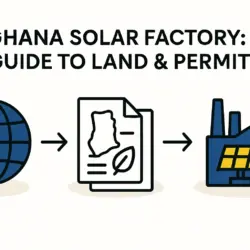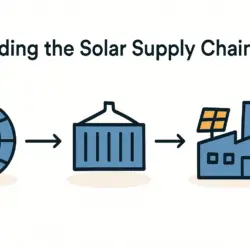Solar irrigation is transforming agriculture in Ghana by providing cocoa farmers with a sustainable solution to combat unreliable rainfall and prolonged droughts. This technology, supported by innovative financing from the International Water Management Institute, empowers smallholder farmers to boost their productivity and resilience in the face of climate change.
Addressing Climate Impact on Cocoa Farming
In the Global South—where agriculture sustains rural communities—farmers face daunting challenges, from limited access to technology to the impacts of climate change. These issues are especially severe for cocoa farmers in Ghana, whose livelihoods depend on the success of their crops.
As climate change brings more unpredictable weather patterns and prolonged droughts, farmers in the region are increasingly vulnerable. But a new solution is on the horizon: solar irrigation. This innovative approach, backed by financial models tailored for smallholder farmers, is reshaping agriculture in Ghana and giving farmers hope amid a changing climate.
The cocoa sector in Ghana contributes significantly to the global cocoa supply, yet water management remains a persistent problem. Farmers struggle with increasingly unreliable rainfall, leading to declining crop yields and deteriorating cocoa quality. Solar irrigation offers a viable solution, using solar-powered systems to draw water from underground sources and irrigate crops even during dry spells.
Despite its promise, solar irrigation has yet to be widely adopted among smallholder cocoa farmers. High upfront costs and limited access to credit have prevented many from implementing this sustainable solution.
Recognizing this challenge, the International Water Management Institute (IWMI)—through the CGIAR’s Excellence in Agronomy Initiative (EiA)—has developed innovative financing options to make solar irrigation more accessible to farmers.
Pioneering Financing Models for Solar Irrigation
The IWMI’s financing model is designed to ease the financial burden of solar-powered irrigation. Developed in collaboration with local banks, irrigation suppliers, and organizations like the Mastercard Foundation, it offers cocoa farmers in Ghana access to low-interest loans with flexible terms.
Local banks such as Access Bank Plc have demonstrated their commitment by partnering with IWMI to provide affordable financing tailored to the needs of farmers. These loans feature a low, flat interest rate of 7% and extended repayment terms of up to four years.
Farmers are also given a six-month grace period before starting loan repayments—a moratorium that allows them to prepare financially and recover from potential crop failures before their financial obligations begin.
Pearl Nkrumah, executive director of Access Bank Plc, highlighted the importance of this initiative: “At Access Bank Plc, we deeply value the pivotal role cocoa farmers hold in Ghana’s economy and are mindful of the climate challenges that impact their work. Through flexible, low-interest loans for solar irrigation equipment, we aim to boost productivity, strengthen resilience, and uplift livelihoods.”
Group Ownership Models: Empowering Cocoa Farmers
One of the most innovative aspects of this financing model is its emphasis on group ownership. Farmers can join forces, forming small groups of three or larger collectives of five to share the costs of solar irrigation equipment. This collaborative approach allows them to pool resources, access the technology more easily, and share knowledge, strengthening their communities’ overall resilience.
IWMI’s group ownership model for solar-powered irrigation makes this sustainable technology more accessible to smallholders in Ghana, fostering collaboration and knowledge exchange among them. By lowering financial barriers, this approach encourages wider adoption of solar irrigation, strengthening food security, economic stability, and rural development.
Solar irrigation is more than an agricultural innovation—it is a solution that empowers farmers, strengthens rural economies, and promotes sustainable development. Through these pioneering financial models, IWMI and its partners are making solar irrigation accessible to smallholder farmers in Ghana, enabling them to overcome the challenges of climate change and build a brighter future.



